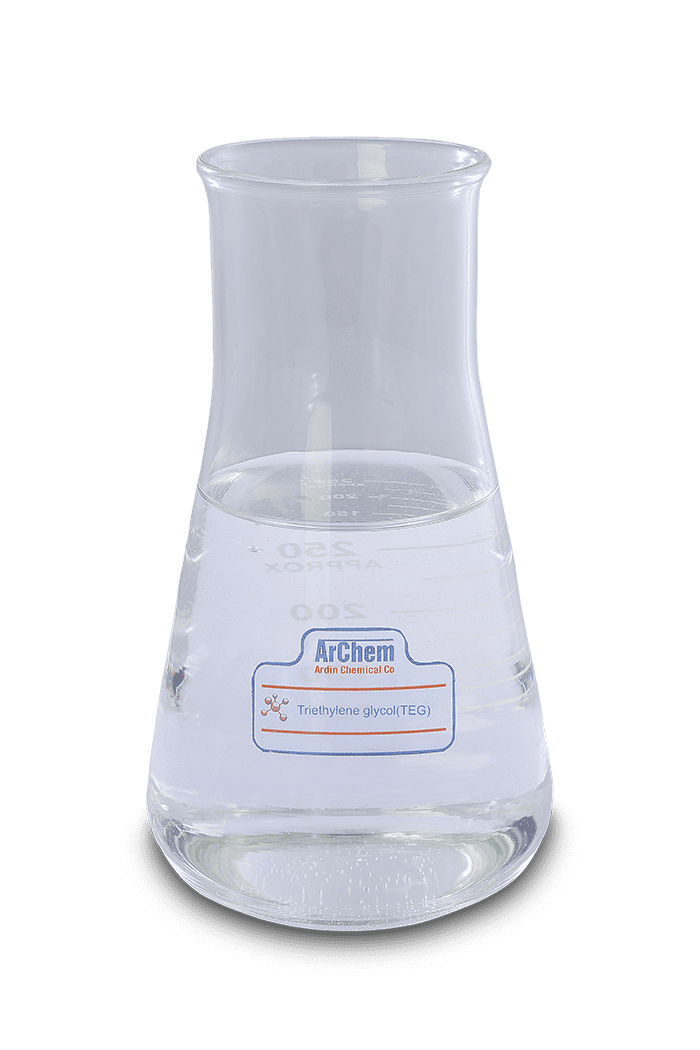Triethylene glycol (TEG)
Triethylene glycol (TEG) is a colorless, viscous liquid with molecular formula C6H14O4. It is a member of a homologous series of dihydroxy alcohols. TEG is soluble in water, ethanol, acetone, acetic acid, glycerine, pyridine, and aldehydes.
ArChem provides TEG and other raw chemical materials such as MEA, Soda Ash, and LABSA for various industrial applications. Additionally, ArChem provides customers with other chemical products including Nitrocellulose, Nitrocellulose solution, organic solvents, etc. For further information please contact our technical sales team in ArChem.
What is Triethylene glycol (TEG)?
Triethylene glycol (also known as TEG, triglycol and trigen) is a viscous liquid with a slight odor. It is non-flammable and considered non-hazardous. It is known for its hygroscopic quality and its ability to dehumidify fluids.

Triethylene glycol is used as a plasticizer for vinyl polymers. Plus it is used in construction materials, cleaning products, fabric, textile and leather products, paints and coatings, personal care products, and plastic products.
Triethylene glycol (TEG) technical properties
TEG is stable under normal conditions. It is often used to dehydrate natural gas. TEG advantages include:
- Low volatility
- Low boiling point
- Solubility with water and a wide range of organic solvents.
The chemical and physical properties of ArChem TEG are:
| Molecular Formula | HOCH2(CH2CH2O)2CH2OH |
| IUPAC name | 2-[2-(2-hydroxyethoxy)ethoxy]ethanol |
| Cas Number | 112-27-6 |
| Molecular weight | 150.17 g/mol |
| Density | 1.1 gcm–3 |
| Boiling Point | 285 °C |
| Flashpoint | 168 °C |
| Melting Point | -7 °C |
| Flammability | Non-flammable |
TEG applications
TEG has different applications in various industries. Some uses of ArChem TEG include:
- Antifreeze
- Coolants
- Chemical intermediateS
- Gas dehydration
- Heat transfer fluids
- Polyester resins
- Solvents
TEG production
Triethylene glycol is produced as a co-product of the oxidation of ethylene at high temperatures and in the presence of silver oxide as a catalyst. Then, the ethylene oxide is hydrated to produce mono, di, tri, and tetra ethylene glycols.
TEG storage
TEG should be stored and transported in stainless steel or aluminium tanks. Storage conditions of ArChem TEG are listed below:
- TEG should be stored away from incompatible materials (strong oxidizers, strong acids, and strong bases).
- TEG containers should be kept tightly closed.
- TEG should be stored in a cool, dry, and well-ventilated area, away from direct sunlight.
- The recommended storage temperature for TEG is 15-25 °C.
- TEG should be kept away from food and drink.
TEG health hazards
TEG should be kept away from heat, decomposition takes place from temperatures above 200 °C. When handling TEG, workers should wear appropriate PPE (including gloves, safety glasses, and protective clothing). Some of the necessary first-aid measures are described below:
- In case of inhalation, move the affected person to fresh air.
- In case of ingestion, rinse mouth thoroughly with water. Never give anything by mouth to an unconscious person.
- In case of skin contact, immediately flush the skin with plenty of water for at least 15 minutes.
- In case of eye contact, rinse immediately with plenty of water for at least 15 minutes and get medical attention.
Operators should wash their hands thoroughly after handling.
Raw chemical materials are used in the production of chemicals, cosmetics, disinfectants, pharmaceuticals and food industry. ArChem provides customers with the best quality raw chemical materials and competitive prices on the market.
Please contact us for a price quote, to request detailed product information and specifications, or to have a sales representative call or visit.
FAQ
What is TEG?
Triethylene glycol (TEG) is a colourless, viscous liquid with molecular formula C6H14O4. It is a member of a homologous series of dihydroxy alcohols. TEG is soluble in water, ethanol, acetone, acetic acid, glycerine, pyridine, and aldehydes.
What is the price of TEG?
ArChem raw chemical materials can be purchased in a variety of volumes. Depending on your orders, prices are different. For more information about the TEG price, don’t hesitate to contact our technical sales team at ArChem.
What is the CAS number of TEG?
The CAS number of TEG is 112-27-6.
What is the HS code for TEG?
29094900
What is TEG used for?
Triethylene glycol is used as a plasticizer for vinyl polymers. Plus it is used in construction materials, cleaning products, fabric, textile and leather products, paints and coatings, personal care products, and plastic products.
What is the IUPAC name of TEG?
The IUPAC name of TEG is 2-[2-(2-hydroxyethoxy)ethoxy]ethanol.
